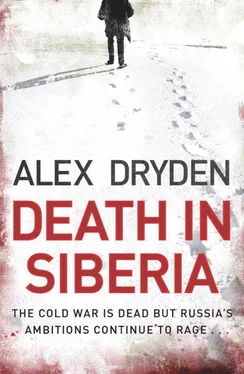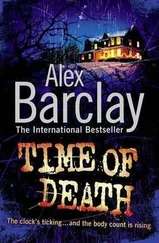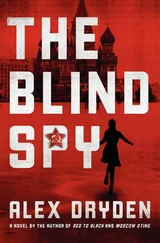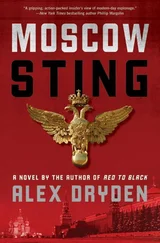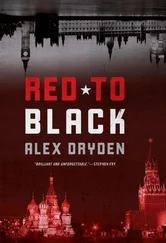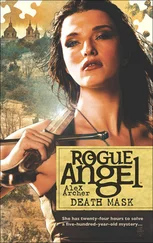He was shown into a large bare room with an outsize desk of the kind favoured by the bureaucrats and intelligence people. Robolev, in uniform, was sitting behind it making a credible pass at being interested in a pile of paperwork. When he looked up, like an enemy interrogator, he fixed Petrov through the lenses of round, Gestapo-like spectacles.
‘Take a seat.’ His tone was more jovial than his expression. ‘You’re… Petrov.’
‘Lieutenant Alexei Petrov, that’s right.’
‘What we want to know is how far you searched the foreigner’s body this morning.’
‘Just to the point where I found his passport. Then I knew it was a job for someone else. For the MVD.’
‘What happened to him?’
‘He was shot in the back of the neck at close range,’ Petrov replied, knowing the MVD would also know the information.
‘A hit?’
‘I doubt it.’
‘Why?’ Robolev asked, and leaned back in the chair, resting his elbows on the arms and swinging gently from side to side.
‘They – or he – left his passport. A proper hit man would know how to get money for that.’
Robolev leaned forward, elbows now placed on the desk. ‘And why were his clothes sliced open, all the linings?’
‘I didn’t see that,’ Petrov lied. ‘Maybe they were looking for something.’
‘Something they expected to be well concealed.’
‘Presumably, major, yes, that would be my guess.’
‘A foreigner with something concealed in the lining of his clothes.’
Petrov didn’t see the need to reply.
‘And then there’s his right shoe, isn’t there?’
‘It seemed to have come away from the sole, as far as I could see,’ Petrov said.
‘Did you examine it?’
‘No, major. Maybe he caught it on something when he was running away from whoever killed him. But, as I say, as soon as I saw the passport I knew it was something for the MVD.’
‘Your lack of curiosity is…’ Robolev seemed to struggle for the right word, ‘unusual,’ he finally decided on.
‘I do my job. I have enough to do in my quarter. I judged the shoe must have come off when the body was moved,’ Petrov said, retreating into police observation. ‘Maybe the sole was partially removed, broken in the probable chase, or maybe it was slit, like the clothes.’
‘How do you know the body was moved?’ Robolev asked suddenly and leaned in triumphantly.
Petrov shrugged. This was common police work. ‘In the area around it there was no sign of a struggle, only signs of the legs being dragged. You could see that in the dust and dirt in the alley. And that’s what they do.’
‘Who do?’
‘Killers. Assassins. They move their victims in case there’s evidence of the ordnance used or if the killing took place too close to people and they didn’t want a victim to be discovered too quickly.’
‘So why did the victim’s body show signs of being so comprehensively searched?’ Robolev said, and focused the flashing lenses of his spectacles more closely into Petrov’s eyes. ‘There were slits in his coat, his hat, he’d been all but strip-searched elsewhere…’
‘As I say, I didn’t see them, major. But they were looking for something, I suppose.’
‘Did they find what they were looking for? In your opinion?’
‘I’ve no idea, major.’
Robolev looked hard at him. ‘But you found nothing,’ he said eventually.
‘After the passport, I handed the case straight over to my boss for referral to your department.’
Then Robolev leaned further forward over the desk and placed his elbows flat on the surface, his knuckles supporting his chin. Once more his spectacles, like gun sights, zeroed in on Petrov. ‘It would be a terrible mistake if a militsiya officer took anything from the scene of a crime,’ he said.
‘I quite agree,’ Petrov replied and stared right back.
On the way out, he realised that Robolev hadn’t asked him to keep himself available, either from oversight or because he was dismissed from his mind as well as his office. But at least it meant he could now say to Sadko that he wasn’t prevented from leaving work.
ANNA’S MAIN EFFORTS as she stood in the line of unemployed were devoted to being inconspicuous, transparent. Transparency was the dearest ally of the agent on foreign soil. Nothing was more important than that. Transparency was the best camouflage.
The most successful agents were the ones nobody ever noticed, the kinds of people you passed by in the street but didn’t really see, or met at a party and whose faces you couldn’t remember later; the people whose names somehow never stuck. The thought crossed her mind that, in an ideal world, she would simply have been invisible.
Her head, like the others’ in the line, was cast down, her demeanour was submissive and her expression was blank. In the other Russian workers in the line, this blankness and submission was the kind of look that came from daring not to hope. And in their case this came from never having very much to hope for in the first place. It was the predominant look in the line and she’d seen it for two days now. The dejection could be seen in the half-hidden faces all along it and she impersonated it well.
What she knew she couldn’t impersonate, however, was the poor state of their physical health. She couldn’t hide what, relative to the others ahead of and behind her in the line, was a robust, good-looking freshness. For one thing, even under her baggy, dirty worker’s clothes, she knew she looked too well fed. And the skin on her face was too clear and had a brightness to it.
The others, for the most part, were thin, pinched and drawn, with grey-looking skin and asthmatic breath that betrayed lives of forced ill-health under the city’s smokestacks.
Her fellow job-seekers reminded her of those dismal newspaper pictures of refugees waiting, unwanted, at frontiers. In any case, they seemed to come from the same tribe of the desperate, the dispossessed, the betrayed and the hopeless. These unemployed Russians pinned any hope they might be able to summon up, from the deepest resources they possessed, on the hiring office and the hiring office alone.
They stood like slumped statues, she thought, only to break the spell of their pained stillness with a foot-dragged shuffle forwards when the line inched towards the concrete hut. It was after eight o’clock in the morning and they’d been in line for more than three hours. But they still formed a sinuous thread that stretched back for almost thirty yards along the river front. It was a weak and pitiful human trickle next to the confident power and muscular strength of the river itself.
There were both men and women in the line and most of them had spent the long Siberian winter unemployed, and in some cases hungry. Dressed in old, faded and colourless working clothes, with tattered quilted jackets slung over their shoulders for warmth, they nevertheless shivered in the cold early June morning. The women wore scarves over their heads in most cases, the men wore fur hats or Russian military winter caps from their conscription days. Except at the city’s aluminium factories, work was scarce here and even in those satanic furnaces it was underpaid. The people in the line knew that if they were lucky enough to be hired for the hard summer labour at the timber mills in Igarka, downriver towards the Arctic Circle, their wages would be barely enough to live on.
As a picture of human dejection, this creeping filament of the miserable and deprived seemed to have leached somehow from the choking smokestacks located pitilessly in the centre of the once triumphantly propagandised industrial Soviet city and which, with their variously poisonous chemical effluents, clouded the air the people breathed and the skies above them.
Читать дальше
